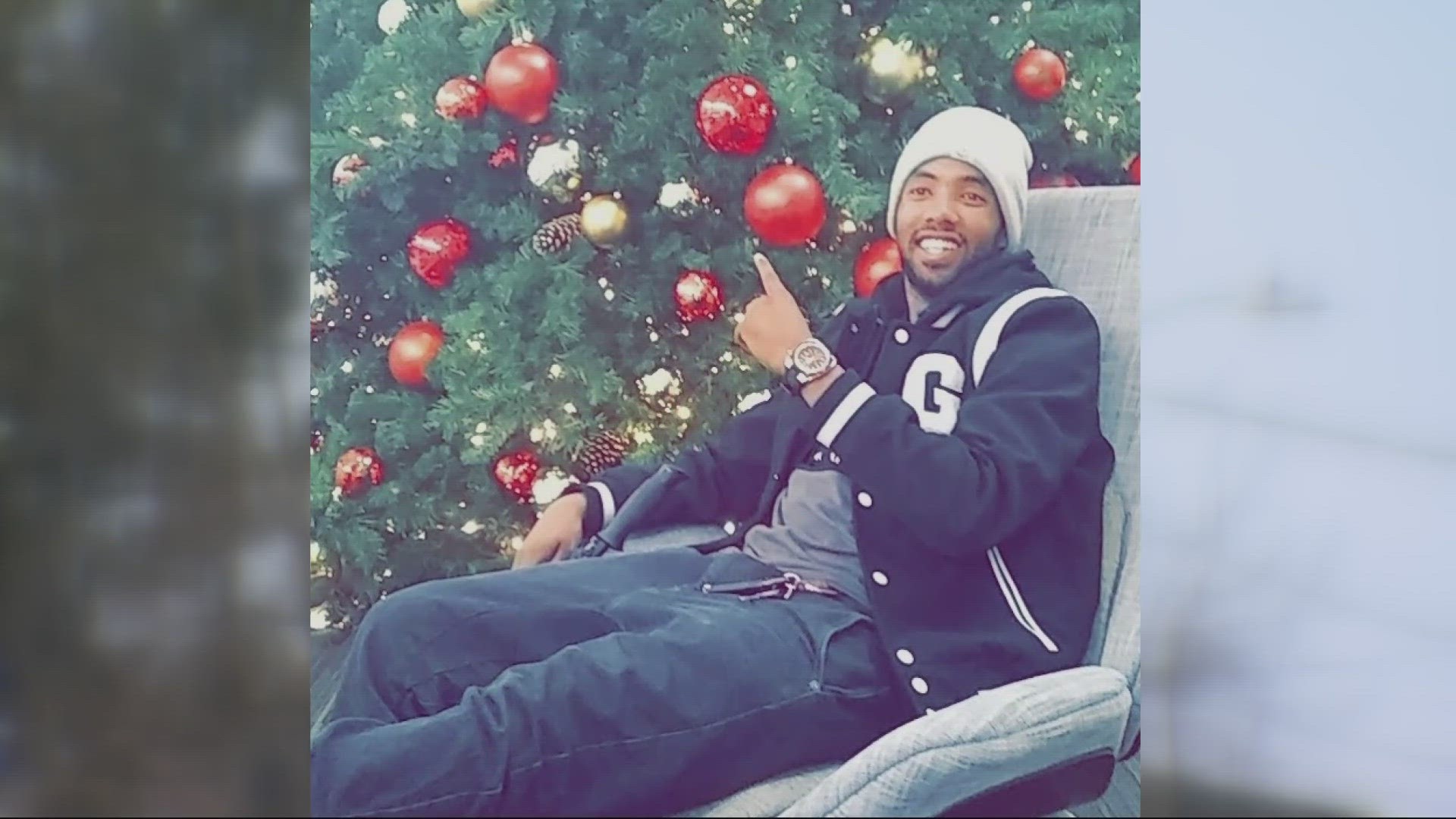PORTLAND, Ore. — The family of a man who died in the hospital after being shot in the back by a Portland police officer is suing the city and the officer.
The lawsuit said Immanueal Jaquez Clark-Johnson, who was 30, was "wrongly and unreasonably" believed to be an attempted armed robbery suspect.
On Nov. 19, 2022, officers responded to a report of an armed robbery on Southeast Powell Boulevard near 50th Avenue and Foster Road. A suspect vehicle description was sent out to the responding officers, and police claimed that Clark-Johnson's vehicle matched the description of the suspect's vehicle. Officers then conducted a traffic stop, saying the driver was "was driving in a reckless manner," then shot Clark-Johnson.
Clark-Johnson died in the hospital five days later from the gunshot wound, the city medical examiner said.
The lawsuit, filed on March 7, said that the city and Officer Christopher Sathoff violated Clark-Johnson's Fourth Amendment rights in both the state and federally. The lawsuit also said Sathoff used excessive force unreasonably and unjustifiably, as well as violated duty of care after shooting Clark-Johnson.
Clark-Johnson's death
The lawsuit details a different set of events from what Portland Police Bureau (PPB) described at the time: Clark-Johnson was simply "standing near" the parked and non-running car. When officers attempted the "stop," the lawsuit continued, Clark-Johnson ran away. Clark-Johnson was unarmed and not threatening the officers, the suit said.
Officer Sathoff then shot Clark-Johnson in the back with an AR-15 rifle, the suit said.
"The police then left him to lay on the concrete parking lot, writhing in pain and bleeding out, for 26 minutes before providing any medical attention," the lawsuit said.
The lawsuit also noted that when officers were provided with the description of the armed robbery suspects, the victim described one of them as "a white man wearing a ski mask and black hoodie." The victim also said that there were three to four suspects, "definitely white men," and driving a sedan.
When officers responded to the call, according to the lawsuit, they followed with vehicles and a police plane, but the officer driving lost sight of the car. An officer in the plane then spotted a sedan with three people inside and parked in a parking lot. The officers on the ground could not see the car, the lawsuit said, but decided to "conduct a 'felony' or 'high-risk stop'" of people who had either exited the car or stayed inside the vehicle. The armed robbery suspects then fled the area.
Clark-Johnson and another man, David Dubois, were standing by a nearby car when police got out of their cars. Both men ran, with Dubois ahead of Clark-Johnson; the lawsuit noted that both Clark-Johnson and Dubois were Black men, not the white men described by the victim.
The lawsuit repeatedly said that the officers had no probable cause or reasonable suspicion to believe Clark-Johnson or the car he was standing near had been part of the attempted robbery.
An audio recording showed Sathoff firing three times, with the bullet lacerating Clark-Johnson's small bowel, mesentery, left kidney and liver, then exiting through his abdomen. As Clark-Johnson bled out, "unable to walk or crawl," and called for help, police prevented "would-be good Samaritans" from providing him with medical aid or calling an ambulance, the lawsuit described.


An AMR ambulance had been prepped one minute after shots were fired, the lawsuit said. The lawsuit concluded that if the ambulance and EMTs been able to get to Clark-Johnson in time, he would have likely survived; two hospitals were also only six miles away from where he was shot.
Thus, when Clark-Johnson reached OHSU — almost half an hour later — "there was nothing the doctors could do to save his life." The lawsuit said Clark-Johnson died two days later, on Nov. 21, 2022.
The lawsuit also outlines multiple instances throughout the years when Portland police shot people and did not attempt or call for medical assistance for a lengthy period of time.
In December of 2022, the agency released the names of nine officers who fired their weapons during confrontations with suspects, including Sathoff, a 4-year veteran of the agency. A grand jury later determined that Sathoff's use of force was not criminal under Oregon law.
The Oregon Justice Resource Center, which is representing Clark-Johnson's family, had shared a tort claim notice last October, notifying the city that the family intended to file a lawsuit.
"Officer Sathoff claims he saw Mr. Clark-Johnson reach into his pocket, which Officer Sathoff believed could contain a weapon," the attorneys said in their tort claim notice. "Officer Sathoff never saw a weapon or any other object in Mr. Clark-Johnson’s pocket. Officer Sathoff later testified to a Grand Jury that he feared Mr. Clark-Johnson would retrieve a gun from his pocket, run behind other vehicles in the parking lot, turn back toward officers, and shoot at officers."
While investigators testified during the grand jury proceedings that a gun was recovered somewhere at the scene, it was not within Clark-Johnson's reach, the tort added. And the OJRC said that police confirmed that no one in Clark-Johnson's car that night had been involved in the armed robbery.
The current lawsuit asks for damages and fees, as well as a jury trial. A grand jury did not find Sathoff's use of force criminal under Oregon law. PPB confirmed Sathoff returned from administrative leave afterwards, and is currently "an active member of PPB.
"At the end of the day, it is important to have a jury weigh in on how it is that this family can be compensated and whether the city needs to be held accountable," said Juan Chavez, Director of the Civil Rights Project at the Oregon Justice Center.
KGW has reached out to PPB and the city of Portland. PBB said they cannot comment on pending litigation and referred KGW to the City Attorney's office.

